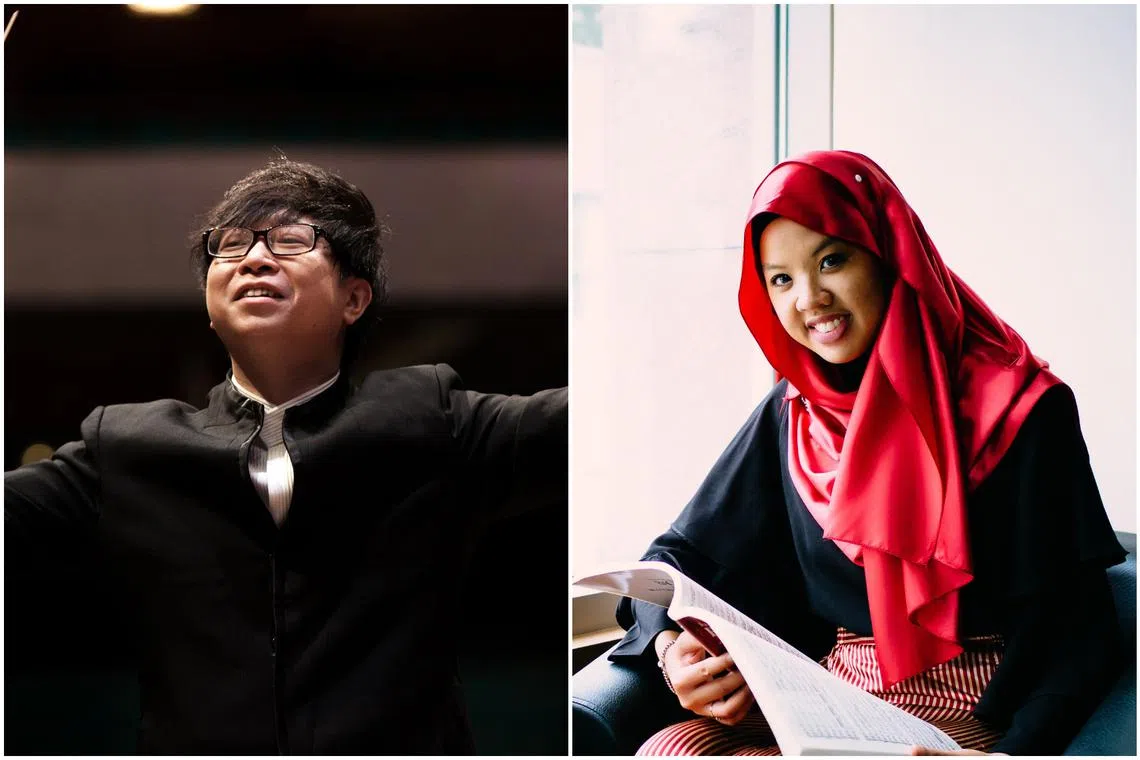Concert review: Home-grown talents Kahchun Wong and Syafiqah ‘Adha Sallehin shine in SSO concert
Sign up now: Get ST's newsletters delivered to your inbox

Kahchun Wong (left) and Syafiqah ‘Adha Sallehin were united again in the world premiere of Syafiqah’s Aeriq’s Lullaby.
PHOTOS: ANGIE KREMER, JEFF LOW
Kahchun Wong and Daniel Lozakovich
Singapore Symphony Orchestra
Esplanade Concert Hall
Last Saturday, 7.30 pm
Twelve years ago, Kahchun Wong and Syafiqah ‘Adha Sallehin were fellow composition students at the Yong Siew Toh Conservatory. They were pioneering members of the Asian Contemporary Ensemble (ACE). Founded by Wong, who was also its conductor, the visionary ensemble championed modern works by young Asian composers.
All that changed when Wong was awarded first prize at the Gustav Mahler International Conducting Competition in 2016. ACE was disbanded while Wong became chief conductor of the Nuremberg Philharmonic.
In September, he will assume the helm of the Japan Philharmonic.
Syafiqah, the first Singaporean Malay music graduate from the conservatory, composes music which fuses Malay and Western classical idioms, besides being an accomplished accordion player.
The two were united again in the world premiere of Syafiqah’s Aeriq’s Lullaby, a nine-minute programmatic work inspired by motherhood and the birth of her son. There were no ethnic influences here, instead its idiom was closer to Disney film music, being very easy on the ear.
There were some dissonances in the central section Through Sleepless Nights, with woodwind glissandi and brassy wails depicting night terrors and a baby’s distress. Guest concertmaster Wang Jing’s violin solo provided reassurance and the closing A Mother’s Prayer was bathed in the warm embrace of C major. All’s well that ends well in this child’s world.
Equally agreeable was Mendelssohn’s Violin Concerto In E Minor with Swedish violinist Daniel Lozakovich in the solo role. His modestly scaled tone suggested intimacy, more like chamber music than a commanding show of virtuoso prowess. Coming into his own in the first movement cadenza, the slow movement that followed was pure lyricism belied by underlying tension. The finale’s elfin dance, prodigious in his control, pulled out all the stops.
Lozakovich’s two solo encores were also excellent. Nathan Milstein’s Paganiniana brought a collective gasp of surprise from the audience as it recognised Paganini’s Caprice No. 24 as the main subject, while Tchaikovsky’s Valse Sentimentale, a salon piece, sounded even better when unaccompanied.
For the concert’s second half, conductor Wong emerged with a change of outfit to conduct Brahms’ Symphony No. 4 In E Minor from memory. And what a memorable performance it was.
The opening Allegro non troppo was taken at a measured tempo, allowing much orchestral detail to be savoured and the climax to be sufficiently shattering. Similarly, the second movement’s procession exhibited restraint before blooming into expansiveness on the crest of a wave.
The rousing Scherzo’s adrenaline rush saw the audience applauding prematurely, and Wong used this to acknowledge percussionist Mark Suter’s few minutes of tingling frisson on the triangle. The closing Passacaglia was the symphony’s crowning glory, its series of short variations on a ground bass tautly held together with an inner urgency.
Marshalling orchestral forces at full tilt and taking both symphony and concert to a grandstanding conclusion, Wong showed exactly why he has become Singapore’s most sought-after maestro on the international concert circuit today.


